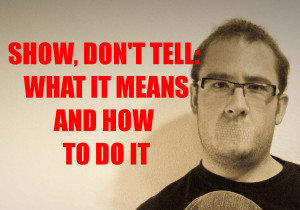It’s the first rule of writing. We hear it all the time. In fact, it’s almost all we hear. Over and over again, they tell us…
Show, don’t tell.
Show; don’t tell.
Show! Don’t tell!
In the name of all that’s good, what the heck does that mean???
Well, it’s kind of complicated. And it’s kind of hard to put your finger on it. And it’s kind of going to take more than one blog post. But let’s start with something simple.
Description!
Remember how we had so much fun guessing who the voices in Voice Week were, and where they came from and why they did the things they did?
We were able to do that because the writers were showing. Show Don’t Tell really means “don’t say it; convey it.” Separate facts from opinion, and then tell the facts in a way that guides your readers to the right opinion. In other words; don’t tell your readers the princess is beautiful; describe her in such a way that your readers say she’s beautiful.
Here’s an example:
She had long blonde hair and green eyes. She was beautiful.
Meh. Laundry list followed by the writer telling me what to think. Here’s a version that shows:
Her golden hair flowed all the way to her waist, and her eyes flashed, green as emeralds.
Cliché, I know, but the point remains: I never used the word beautiful; I didn’t have to. Words like golden, flowed, and emeralds show us she’s beautiful.
Now let’s step it up and try to cut out the cliché. Another way to show is to write the reactions of other people. Show the reader how the princess makes the knight feel. Not like this:
She made him feel nervous.
Or even this
He grew self-conscious under her gaze.
That’s telling your reader he’s nervous and self-conscious. Instead, give the reader clues and let them figure it out:
When she turned her head, her hair rippled, like wheat when the wind sweeps across it. When her green gaze fell on him, he forgot to breathe. When she smiled, his knees nearly gave out. And when she asked his name, his tongue stumbled all over his teeth to reply.
See how we used his physical reactions to show just how beautiful she is, without ever using the word? We also know the color of her hair without saying it.
We can even take the same laundry list (long blonde hair, green eyes) and twist it around completely:
Her hair, which stuck out in every direction, was lifeless and stiff, and exactly the same color as dead grass. He could imagine grabbing a handful and hearing a crunching sound. She felt his stare and glared back, but her eyes were lifeless as well, dull as a faded tapestry.
Ultimately, telling is just giving your readers knowledge. Showing is helping your reader see and hear and feel what’s happening. It’s the difference between being told the princess is beautiful, and believing the princess is beautiful.
—
Read more about Show, Don’t Tell:
Getting rid of background exposition (part 1)
Getting rid of background exposition (part 2)
Character sketches: telling to show
—

Show, don’t tell: What it means and how to do it



